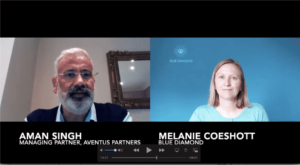Having heard what each leader had to say, we now look at each of the questions in turn.
What does great leadership mean to you?
Having inspired me along my journey, I couldn’t help but ask what great leadership means to them.

Adam Mussert – in reflection on this, I’ve thought a lot about the people I’ve worked for, the people who’ve been leaders in the organisations I’ve worked for and thought what really made a difference for me. And it has become apparent to me over the years that the quality of my manager and the leader of my function is really important to me.
So, I’ve identified 4 main things that come to mind:
Having a clear vision of where they want their team, their function or their organization to go. And a clear path to get there. I think that clarity is really important in a leader.
Connected to this, is having an ability to communicate that vision, that roadmap, in a way that really connects with people. Because they also need to be able to take people with them. And taking people with you and the ability and willingness to be led by you is part of creating that engagement and instilling that motivation in people.
But it’s also another quality which is having an awareness and an empathy for people. It’s not just about compelling people to be part of your team, but by actually winning their hearts and minds, so they want to be a part of where you’re going. If they buy into your vision and the way you’ve articulated it: you have an ability to get the best out of those individuals.
Then I think there’s another piece which is following that vision. That path isn’t always easy, so there needs to be resilience and on occasions courage. Either to keep going when it gets tough or sometimes having the courage to stop, take stock and consider whether things have changed or you were wrong. And then having the courage to make those decisions or acknowledge those situations.
I think these are all signs of great leadership.

Aman Singh – When looking at a professional service firm, and I think this would apply to any business, great leadership for me would characterise someone who’s got both professional will as well as humility. I think both things are very, very important.
By professional will, I mean someone who has a deep and unwavering desire to create an enterprise that can continue to survive for years to come. Even to do whatever it takes to create benefit for the organisation. The focus is the organisation before anything else, and that includes the people within the organisation.
The other characteristic of someone having great professional will would be someone who’s willing to learn, continuously learn and grow, and help everyone around them to also grow and succeed. This is someone who is trying to build an organisation that has lots of successes, so basically, the team needs to develop alongside them, and it is based on trust and relationship and collaboration.
By humility, it would be someone who’s humble, who’s modest, who has inspiring standards within the organisation and outside as well.
This could be both on a personal level as well as a business level. Someone who is willing and always able to take responsibility for failure, and someone who is happy to share or even give credit for all successes to others. This is someone who is not greedy, not just in the financial sense, but also in their professional environment to take credit for all the successes themselves, shunning the efforts made by the team for their success to truly happen.
I think for me those two are very, very important.

Debbie Fogel – Well, that’s a great question.
I guess there’s a kind of a textbook answer but I think my reflections are really looking at the people that I’ve worked with and for, both the good and the bad! Early on in my career, I remember thinking for some “that’s the kind of leader I want to be” and for others “that’s the kind of leader I really don’t want to be” so I think there’s learning on both ends. But a few things come to mind as to what makes a great leader to me.
The first one is certainly authenticity. I think knowing yourself, your strengths and shortcomings is very helpful and to have people around you that complement your skill set and where you feel comfortable with that. As well as authenticity, in terms of behaviour it’s about really doing what you say. I think people in an organisation get very confused when we say one thing and do another. And I definitely enjoy being an organisation and trying to emulate that myself, that is we do what we say.
Second, I think having an innate care for people is really important. I do myself really care about the people that work in the organisation and work on my team, and so that comes very naturally and I think people sense that I care about their development and their success and the team very much. I appreciate that as well in the leaders that I’ve seen and I think that that compassion really comes across in terms of great leadership.
I also think communication is really important: that clarity of thought as a leader is really important to help the organisation understand where we’re going. And even when there are issues, really having that clear thinking and the ability to communicate that out to others is really important. That also comes with listening, but I really think being able to communicate vision and intentions and the big picture, decisions and the context of decisions is really, really important.
Then I also think that having a learning mindset, being open to change, being open to other peoples’ inputs. We hire smart, great people. We should listen to the people around us and not have to have all of the answers ourselves. So, I think a great leader really listens to others and is open minded.
I think people don’t enjoy (at least I don’t) working around people who have all the answers, because then we don’t feel like we’re making an impact with our experiences and the way we think and that collaboration doesn’t exist when there is a lack of open mindedness. I think that’s really important.
Then of course, it maybe goes without saying but I’ll say it anyway. I think it takes courage to be a great leader. The risk of being vulnerable and making mistakes, and the responsibility of it takes courage, sometimes difficult conversations, as well as some optimism.
I am reflecting on a few great leaders that I’ve worked for and one of their wonderful traits was that ability to take a huge challenge, something that felt potentially devastating to the organisation and really turning that around as an opportunity, through a positive lens. I’ve definitely respected that skill – I think it’s super important.
Then again back to the ‘no hypocrisy’. I personally don’t like to work for organisations that are full of hypocrisy. Really, it’s back again to that first point about authenticity and doing what we say.

Dr Celine Vousden – I’ve seen some examples of great leadership and some not so great, and it’s very interesting to juxtapose and compare and contrast the two.
Of the elements for me that really stand out, one of the key things is integrity. Honesty, having the courage to admit mistakes, being able to leave their ego behind and show up quite transparently. That to me is a quality that will inspire confidence, and trust, and shows courageousness, courage, and authenticity.
Really having that integrity, allows others to trust and evokes trust and confidence from people. For example, recently when the CEO of Zoom, Eric Yuan, he admitted when they had the security issues very openly, and it was quite inspiring to see like, “Absolutely, we made a mistake. I really messed up. This is what we’re going to do about it.” It was interesting to see how people’s reaction to that, and how that was held up as a great example of leadership. I think, historically perhaps, cultures have not been so open to admitting mistakes, but we’re increasingly realising the importance of that and seeing more and more leaders demonstrating those qualities of integrity.
Other factors, include:
Having focus and being connected with your vision and really being energized by that, because when the leader is able to so strongly and passionately connect with their vision, that imbues or infuses that kind of pattern and connection to the vision amongst other people, and that can be contagious. In a psychological phenomenon, that’s called emotional contagion or mimicry, but also, it’s very confidence-inspiring or instilling to see and witness a leader that’s so committed and connected to their vision and understands their “why”, as Simon Sinek would say.
Somebody that’s able to listen. For me, these soft skills are very important. I think thankfully, it’s gaining increasing recognition. Someone who’s able to support their people, listen to their people, and to all levels of the organization, to all people within the organization. To create some open space and safe spaces for that to happen so they can listen to people from every part of the organization, to understand what’s going on, to really get a sense of the pulse of the organization and what needs to change, how things are playing out, and whether the people are connected to the culture that that leader is wishing to create and co-create with his people.
I think that kind of cultivating a sense of belonging, and identity, and connection to an organization’s really important from a psychological perspective and also a neuroscience perspective. We all operate, historically, from an evolutionary perspective. Social safety is an important, a crucial aspect for us to not only survive but thrive as well. Without that social safety and sense of belonging, we can experience a threat and stress, which can then hamper our performance. Really fostering or creating a culture within a workplace that has that sense of belonging, so people are connected to the organization and the culture and they know what the values that they stand for, and are really connected with that.
A leader must trust and respect their people. I know we’ve spoken about this, I’ve got 2 children of 3 and 5, and that’s been such an interesting journey in terms of my own self-awareness and self-development, but there are such parallels with parenting. The more you trust and respect and gently guide a child – I can really see that in the workplace too – the more you create a space, and you trust, and respect people around you and allow them to thrive and become their best potential self and create the conditions for them to do so, but not always recognizing what they’re doing wrong, but literally, trusting that they’ll find that way to grow and develop.
Emotional self-awareness is really key to me. A good leader is somebody who’s able to recognize the situations that allow them to thrive, to recognize when actually they may not be operating or performing at something. Peak performance is an area that I’m really interested in, and which factors perhaps may knock them off from that and how can they bring themselves back into their peak performance and flow state as some of the things.
And finally, one which is probably crucial right, just thinking of the current coronavirus pandemic that we’re experiencing is such an upturning of the world. It’s that ability to weather storms and rapidly adjust to a situation that can suddenly change and have the belief in self, the trust however they arrived at that decision, but understanding if they need to course-correct or when to dig deep, and trust, and commit to the vision, and having that decisiveness and knowledge, but that ability to weather storms is vitally important.

Garry Crosby – I think great leaders have got to show a lot of energy and passion. They’ve got to be able to convey the purpose of their business really, really effectively and if they can’t show that path towards something that’s more worthwhile or better, then, from my perspective, they’re not really fulfilling their role as a leader. I think about Lord Coe in the 2012 Olympics and that fantastic passion he had for creating something that was great for the UK.
I also think that leaders have got to show a fantastic way of connecting with people. If I think back to one of the best bosses that I ever had: a Wing Commander who ran one of the Squadrons that I was flying in. He had this unerring ability to make you feel like you were the most important person in the world, while you’re talking to him, and it was very rare characteristic. I don’t think it’s something that could be taught.
So, you could have energy and passion and the ability to connect.

Jenny Garrett – Oh, that’s such a big question, isn’t it? I think at the moment, in COVID-19 times, great leadership looks like compassionate leadership.
It looks like someone who takes the time to care about other people, to think about what they need, to not push for results at the expense of humanity or human. I think it means being human with other people. I think we’ve really seen a difference time now where people like Jacinda Ardern from New Zealand have risen to the top as the sorts of leadership that we would want to amplify and someone who exemplifies what good leadership looks like.
Maybe it’s a little bit more of what people would call feminine leadership. It’s all about those softer elements that sometimes people don’t think are that important but are hugely necessary.

Johan Gabriels – Well, I think, as a leader you always have a positive intention and a certain vision.
I’m, a leader who likes to work with people, so I want to show that I’m available for my team, to teach them, to mentor them.
For me, it’s about positive intentions and it’s about having a true interest in people.
And also listening to people. I think the latter is definitely the case with the millennium generation.
That’s what I would qualify as great leadership.

Kate Morris – For me, it’s about open and transparent conversations. Being authentic when they’re speaking is really important. I resonate with personable people. I want to be able to hear them talk and be passionate. Passion is not a bad thing. You want to be able to be inspired by the people that you are listening to.
Emotional intelligence is also a really big thing for me. Absolutely thinking about different time zones, different cultures and when English isn’t a first language. It’s about making sure that you’re aware of those kinds of things. In MasterCard, you have to be able to adapt and work with different teams at different times of the day, so you have to be mindful of all that.
I think as well: knowing your team, knowing the strengths that they all bring together to make that cohesive unit, knowing how to get the best out of your team, that, to me, is the sign of a good leader.
Their coaching, their being able to inspire, be passionate about these things, and lead their teams to do great work.

Keith Douglas – That’s a great question.
My leadership journey has been very much been shaped and influenced by the people I’ve worked for, either directly as my leaders or unit heads, and indeed also by some of my peers, who I’ve learned from over the last twenty odd years.
So, what does great leadership means to me? It means a number of things.
It means essentially that I have a duty and obligation with my team, to enable them to perform in a way that maximizes their skills, their potential, their excitement and their energy.
It’s my job to facilitate an environment that enables those individuals to shine, and clearly then corralling that in a way that drives business unit objectives and deliverables.
So, first and foremost, as a leader, I’m there to help those in my team, and those that my team work with, to deliver in a way that is impactful, inspiring and certainly meets the needs of the solution to the pain points or whatever it is, we’re focused on.

Lesley Spencer – I think the most important thing for me is an ability to read and understand people.
Some people have the view that to be a leader, you have to kind of force people to come along with you. That’s not my view at all. You have to be able to take people with you. I think you have to do it in a way that they very much understand where you’re going, but also that you very much understand them. It’s about understanding people as individuals and being able to bring the best out in them, and getting them to bring the best out in themselves as well.
I think you can only do that by listening, understanding and actually looking for people’s individual strengths.
If I think about all the people that I’ve worked with over the years and I think about their different strengths and the differences in their behaviours. The key thing that I’ve done is to adapt my style to the individuals that I’ve worked with to make sure that I can bring out the best in them.
I think people and communication are the key things, as well as having a very clear view on where you’re going and being able to communicate that.
Also, being able to adapt and change that and take on board suggestions and feedback from the people that you’re working with and very much act together, as a team.
I think it’s very important to value the people that you work with and also to ensure that all your actions and your words marry up. I don’t think you can say one thing and then act differently. People see through that and they want you to be genuine and authentic. You need to do that as a leader and you need to expect that from the people that you work with as well.
Thanks for reading. Check out the other interviews in the Post Lockdown Leadership Review series.
Check out other Blue Diamond articles to help you take control of your work and life.
